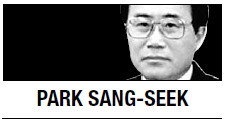The world is witnessing the conflict between the Jewish and Islamic civilizations in Israel, the Islamic sectarian conflicts in Syria and Iraq, the tribal and Islamic sectarian conflicts in Afghanistan, an ethnic-nationalist conflict in Ukraine and the unrelenting tension between the two political systems on the Korean peninsula, while observing peace in Western Europe.
This shows that the root-cause of these conflicts is the lack of national identity. In other words, the peoples in these conflict-ridden states consist of different primordial (ethnic, tribal, racial, religious, sectarian, regional) or ideological groups and fight for either the total control of the existing state, the establishment of separate states, or power-sharing.

The principle of self-determination is to solve this problem: Each nation should be granted the right to have its own state. But in reality this principle is rarely observed. After World War I it was partially and imperfectly applied to Eastern Europe, and after World War II it was almost completely ignored in the former Western colonies. Most former Western colonies in the Middle East and Africa were granted statehood that ignored the heterogeneity of the people in each colony. In most cases, the independence leaders themselves demanded it. In the case of Korea, exactly the opposite happened: A homogeneous nation was divided into two separate states. The occupying powers, the U.S. and the Soviet Union, and the Korean political leaders reluctantly accepted this two-state solution as a temporary measure.
As a result, most newly- independent states suffer from an identity crisis. National identity is founded on at least one of four primordial bonds: ethnicity (race, color, or tribe), religion (including religious sect), culture (including customs, behavioral patterns, and values and beliefs) and ideology. Ideology, which has become one new source of national identity since World War II, cannot be as strong as the primordial bonds, because chiliastic ideologies tend to be propagated and used by dictatorial rulers or ruling elites to realize their political purposes, while democratic ideology can be popular, its support base is fluid and not as cohesive as that of primary groups in developing nations.
The Korean people are one of the most cohesive ethnic groups in the world. They are bound by the same blood ties, the same culture and the same language, and their ancestors have lived in the same territory from time immemorial. From the unification of the three kingdoms by Silla in 676 until Japanese colonization in 1910 they had lived under a single political system ruled by the same ethnic group, though the ruling class was changed three times.
The establishment of two separate states in the Korean peninsula at the end of the Pacific war started the erosion of Korean national identity. The states were founded on two diametrically opposed political ideologies and began to undermine the identity of the Korean nation through different approaches to modernization.
They have kept the Korean language intact, but they have adopted some different grammatical rules and words. Their respective territories have blocked mutual communications, as well as the movement of people and goods, almost completely.
The most fatal damage to Korean national identity has been inflicted on Korean culture. Influenced by Western democratic and capitalist culture in the South and totalitarian and communist culture in the North, Korean culture has evolved into two different ones. Some North Korea watchers believe that Western culture has been increasingly seeping into the North and will eventually undermine the North Korean political system.
I am more concerned about the erosion of Korean national identity in South Korea. It is unlikely that Koreans in the South will lose their bond as a homogeneous ethnic group and become mired in religious or sectarian conflict. This is because their primary ties are still strong and their tradition of “secularizing religions,” which is conducive to the Western tradition of separation of religious and spiritual authority, makes such a conflict unlikely to happen. But some Western and capitalist values and beliefs, such as extreme individualism, materialism, emphasis on competition, and equality, have eroded traditional Confucian moral codes. This trend will eventually undermine Korean national unity and identity.
But Koreans cannot afford to abandon Westernization and modernization, because Korea will not be able to enjoy economic prosperity and democracy without them. Under the circumstances, they should understand Western values and beliefs correctly and harmonize them with the traditional Confucian codes of ethics so that they can reinforce them.
The main Western values include liberty, equality, rationalism and representative government, while Mencius’ four cardinal virtues ― ren (benevolence or compassion), yi (justice), li (generosity and moderation), and zhi ( wisdom or reason) ― are representative of the Confucian moral codes.
A more urgent task for the Koreans is to root the legitimacy of the state and the ideals and goals enumerated in the Constitution in their culture, and to restructure and consolidate their national identity. The basis of state legitimacy is the democratic republican form of government, and the ideals and goals of the state include the realization of national unity through justice, humanitarianism and brotherly love.
Civil society itself should take the initiative to start this new “Moral Rearmament.” The government is mainly responsible for state-building, and civil society for nation-building, although there are closely intertwined and mutually reinforcing.
Aug. 15 is Korean Independence Day but few Korean people hoist their national flag at home.
By Park Sang-seek
Park Sang-seek is a former rector of the Graduate Institute of Peace Studies at Kyung Hee University, and the author of “Globalized Korea and Localized Globe.” ― Ed.







![[From the Scene] At this Starbucks, you need ID: Franchise opens store with view of North Korea](http://res.heraldm.com/phpwas/restmb_idxmake.php?idx=644&simg=/content/image/2024/11/29/20241129050068_0.jpg)
